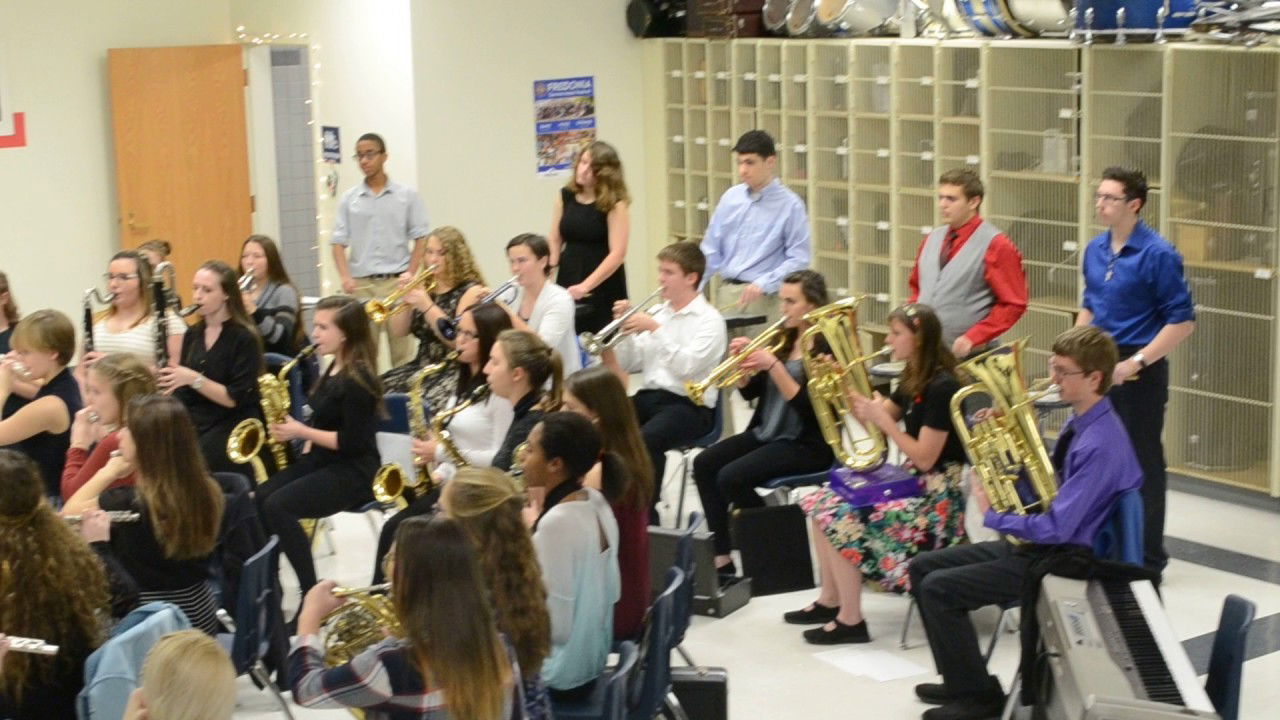Motivating Your Concert Band After a Break

After a break, like the much-anticipated Christmas holiday, a concert band can face challenges in rekindling focus and motivation. The extended time away from rehearsals can lead to a lull in energy and drive, making it difficult for the musicians to jump back into practice. As the conductor, you are the key figure in reigniting their passion, enthusiasm, and commitment to the music. Here are several strategies that can help you inspire and motivate your band to give their best performance after a break:
1. Set the Tone with a Warm Welcome
The first rehearsal after a break should begin with a welcoming and positive atmosphere. Greet your band with genuine enthusiasm and acknowledge the importance of coming together again. Recognize the effort it took for each musician to return and be present. Acknowledging the break as a time to recharge can also help musicians feel more connected to their personal growth and ready to dive back into the music.

2. Revisit the Band’s Goals and Vision
Reinforce the collective goals of the band, whether it’s preparing for an upcoming concert, perfecting specific pieces, or building camaraderie. Share your excitement about the progress that has been made and remind the musicians why their contributions matter. You can highlight the importance of each individual part and how it contributes to the overall sound, helping everyone see their role in the bigger picture.
For some groups and for many songs, it might help to take the time to present the history, meaning, and purpose behind each piece of music. This would tend to establish an intellectual and emotional connection to the material, especially if you tie it back to the overall theme of the performance.
For example, you could discuss how the pieces reflect different emotions and the way that those emotions are expressed musically. What key or mode did the composer / arranger use? What time signature and tempo was used? Did the arranger do something different from the original to add a bit of his or her own character?
You could also reveal the story or circumstance surrounding the origin of the piece. Was it a result of a personal triumph or tragedy in the composer’s life? Was it the result of a national conflict or natural disaster in which the composer was involved?
Lastly, you could discuss how the piece is intended to affect the audience. How is it supposed to make them feel, or think, or act?
3. Establish Clear and Manageable Goals
After a break, it’s important not to overwhelm the band with too much too soon. Set achievable short-term goals that will help everyone ease back into rehearsals. These could include mastering a particular section of music, improving technique, or working on improving such musical artistic skills such as dynamics, establishing, maintaining and changing tempo, staying in tune, and such less common things such as inserting and removing mutes, changing instruments when called for, and other things that make a band into a group of artists, rather than simply a bunch of instrument payers. Smaller, incremental goals are often more motivating because they allow musicians to experience success quickly, giving them the confidence to continue striving for improvement.

If possible, include the students in the choice of music for the spring concert or any other upcoming performance. This could include a number of things, such as:
- Suggestions for music itself. This can be done a number of ways.
The first would involve offering a selection of music from the band’s existing library. Often, this would make up the majority of, if not the whole of, the next concert. These would be pieces that probably hadn’t been played for several years, unless, of course, there is a favorite among players and audience alike that could be played with no objections.
After those available pieces are chosen, suggestions for new pieces could be taken. They might be made from a list that the director has made up, which would reflect his or her understanding of the degree of complexity of the music and how well that difficulty level matches the ability of the band.
Members of the band could also make suggestions “out of the blue” of pop tunes, new or old, that they like. That would involve a little more work on the part of the conductor, but it would be worth it if the band could achieve a goal that they created.
Salt Cellar Creations can do a custom arrangement for you for far less than a commissioned piece would cost. Contact Us for details.
- Location for a concert. That would mean extra work, but it might be possible for leaders in the ensemble to do some of that legwork.
- Who might be featured for a solo or small group performance within a concert piece
The director would, of course, lay out some ground rules, such as:
- Take the process seriously. There are always at least a couple of clowns in any music ensemble, but offering suggestions for the next concert is not a good place to clown around. Remind the members that unless they take the process seriously, as mature people would, the director will be forced to treat them as children and tell then everything they need to do.
- Encourage “out-of-the-box” suggestions, but remind them that the idea must be thought out, at least the more important parts. There would need to be basic answers for each of the journalist’s six questions – Who?, What?, Where?, When?, How?, and Why? For example, if a member suggests a concert on the roof of the building, don’t dismiss the idea out of hand. Ask whoever made the suggestion the six questions. If that person can’t answer them right away, give a deadline within which they would need to be answered.
- Respect the suggestions of others. Here’s a good time to practice the Golden Rule. And besides, the suggestion that someone ridicules today may be the one that he or she must participate in later.

4. Use Positive Reinforcement
The picture above illustrates the two main ways that people can be motivated. The illustration is very simplified, but you can see both ways presented there. The stick represents threats of punishment or other harm. This, of course is rarely recommended for any situation, and never for a music ensemble.
The carrot represents constructive methods, positive reinforcement being among the best of them.
Reinforce good efforts and improvements, no matter how small. Positive feedback from the conductor can inspire players to push themselves further and build confidence in their abilities. Recognize individuals or sections that have made noticeable progress and praise their commitment. Celebrate achievements as a band to foster a sense of unity and pride. Acknowledging the progress since the break will help bring back a sense of accomplishment.
Sometimes band members don’t always recognize the things they’ve done right, or better, especially after having been on a break. You could compare their achievements, large or small, to other bands in general, saying, “Many other bands wouldn’t have done that correctly so soon after a break”.
While bribery is not a favorable way to motivate people, students in particular, rewarding positive behavior can be beneficial to the improvement of any musical ensemble. A “Musician of the Week” (or more, if the band is large) might be a good way to motivate musicians. To promote teamwork, a better idea might be a “Section of the Week”.
5. Incorporate Fun and Creative Warm-Ups
After a break, the band may feel a bit rusty, so start rehearsals with fun, engaging warm-ups that are both musically productive and enjoyable. These could include playful rhythm exercises, sight-reading challenges, or group improvisations. Not only will these warm-ups help with technical skills, but they also build camaraderie and ease tension, making the return to playing feel more natural and exciting. There should be number of etudes for concert band available. If you can’t find what you need or want one written for your particular band, again, Contact Us. We’ll be glad to put one or more together for you.
6. Inspire with Enthusiasm and Energy
Your energy as a conductor is infectious. If you are excited and motivated, your musicians will likely mirror that enthusiasm. Approach the rehearsal with a renewed sense of passion for the music, demonstrating a positive and uplifting attitude. Your excitement can set the tone for the entire band, turning the first rehearsal after a break into an energizing experience. Sometimes, all it takes is a few motivating words from the conductor to help the musicians reconnect with their love for playing.
While establishing a “connection” between you and your band, you need to remember that there is a fine line between being the professional conductor that you need to be and the fun, friendly, sometimes goofy person that would more easily create that connection. The band needs to know and adhere to the practice of creating a pleasant atmosphere in which to play while being serious about the music that the band is making.

7. Create a Sense of Teamwork and Community
One of the best ways to inspire your band after a break is to foster a strong sense of community within the group. Emphasize how everyone’s role is crucial, whether it’s the first-chair flute or the second trumpet. Teamwork is at the heart of every great band, and when the musicians feel like they are part of a supportive and collaborative group, they are more likely to give their best effort.
Consider starting each rehearsal with a brief team-building activity. It could be something simple, like a group discussion about goals for the rehearsal or a game to break the ice. These moments can remind the musicians that they are all working towards the same goals, creating a stronger sense of motivation to contribute their best.
Another way to reinforce the concept that every part is important, and as a continuation of the warm-ups, have just certain parts play a portion of the first piece that you will be rehearsing. The tuba, first trumpet or clarinet and the second horn or trombone could play. Having three parts, bass, melody and harmony, being heard together would, most likely, create a sufficient sense of the music. Then, add everyone else and compare the sparseness of the first group to the full rich sound of the whole ensemble.
8. Make the Music Come Alive
A fresh perspective on the music can inspire the band to play with more emotion and intention. Rather than diving straight into the technical aspects of a piece, try discussing the story or imagery behind it. Explain the emotional highs and lows that the piece represents, and challenge the band to connect with these feelings. When musicians understand the intent and emotional impact of a piece, they are more likely to play with passion and invest themselves in the music.
Additionally, varying your approach to rehearsals can spark creativity and excitement. Change the pacing, add new dynamics, or experiment with different interpretations of the piece. Show the band that there is always room to grow and explore, even in familiar music.
9. Rebuild Routine Gradually
While it’s tempting to jump back into long rehearsals, it’s important to allow the band to rebuild their routine gradually. Start with shorter but focused sessions to help everyone regain their concentration and stamina. This will also help reduce any performance anxiety or stress that may have built up during the break. As the band becomes more comfortable, you can gradually increase rehearsal lengths and challenges.
If a program for the next concert has been settled on, play just a little of each piece, perhaps choosing the easiest parts of each to establish a sense of accomplishment for each. The players will more likely find them more appealing than tackling the whole piece, tough parts and all, at the beginning. The more difficult parts could then be assigned as homework that each musician could work on independently.
Procedure in a group setting, and even more so in a classroom, is important. If everyone knows what to expect and what is expected of them, things move much smoother. Things that might need to be addressed could be:
- How long should it take for the instruments to be tuned?
- Who is responsible for keeping and keeping track of the music for each stand?
- When does the band need to give undivided attention to the conductor – when he or she takes a position behind the podium, or when the baton is tapped for attention?
- Do musicians need permission to use the restroom?

10. Emphasize the Power of Music
Lastly, remind your musicians of the power of music and the impact their playing has on the audience. Music is a form of communication that transcends language, and as members of a concert band, they have the opportunity to touch people's lives in profound ways. Reaffirm their importance in the artistic process and how their dedication helps create something beautiful that can inspire and uplift others.
It might help to play a recording of a band who has done it well, to give them a target to which they can aspire. If there are two distinct interpretations available to hear, it might be interesting to hear how the different bands delivered the same music. If appropriate, the band could then help the conductor decide which variation they preferred.
In conclusion, motivating and inspiring your concert band after a break requires a balance of positive energy, clear goals, and a deep connection to the music. By focusing on building confidence, setting manageable expectations, and reigniting the collective enthusiasm, you’ll create an environment where your musicians feel empowered to play their best. A little encouragement, creativity, and passion can go a long way in ensuring your band is ready to return stronger than ever.
Salt Cellar Creations understands the beauty and power that a Concert Band can convey and the challenge that band directors face in choosing the best music for their ensemble. SCC has a growing library of original works and arrangements to help meet the needs of band teachers and directors Find out more about what Salt Cellar Creations has to offer for Concert Bands HERE. Explore the available music HERE.
SCC can also compose an original piece for you or do a custom arrangement for you to allow you to showcase your group. There are two ways that this can be done; one is much more affordable than the other. CONTACT US for more information. And SCC is always looking for ideas of pieces to arrange or suggestions for original pieces.
We have sold music not only in the US but in Canada, the United Kingdom, France, Australia, and New Zealand, Austria, and Germany. Please visit the WEBSITE or CONTACT US to let us know what we can do for you!